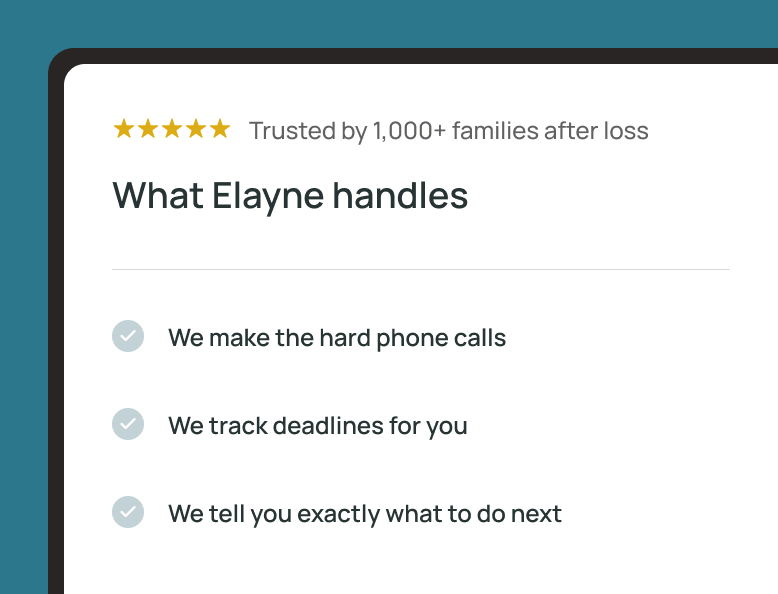Inheriting assets after someone dies can be emotionally and logistically overwhelming—especially when taxes come into play. One of the most commonly misunderstood aspects of settling an estate after a death is understanding when estate tax kicks in and who it affects.
Whether you're named in a will or listed as a trust beneficiary, knowing if and when estate taxes apply can help you avoid costly surprises during the probate or estate settlement process.
What Is Estate Tax?
An estate tax is imposed on the transfer of the estate of a deceased person. It is based on the total value of the deceased person’s assets—including cash, real estate, stocks, and other possessions—at the time of their death.
Estate tax is not the same as an inheritance tax, which is a tax that the recipient of an inheritance pays.
In contrast, estate taxes are paid by the estate itself, before any distributions are made to next of kin and other beneficiaries.
When Do Federal Estate Taxes Apply?
For most people, federal estate taxes are not an issue, thanks to a high exemption threshold. As of 2025, the federal estate tax only applies if the estate’s value exceeds $13.61 million for individuals or $27.22 million for married couples (who have proper estate planning and can use the "portability" provision to combine their exemptions).
If the estate is valued below these limits, there is no federal estate tax owed.
If the estate exceeds these thresholds, the amount over the limit is taxed on a sliding scale from 18% to 40%, with 40% being the maximum federal estate tax rate.
Important note: These thresholds are scheduled to be reduced significantly in 2026, when the provisions of the 2017 Tax Cuts and Jobs Act expire. The exemption amount is expected to drop to approximately $6 million per individual, adjusted for inflation.
State Estate Taxes: A Different Ballgame
Even if you’re not subject to federal estate taxes, state-level estate taxes may still apply. As of 2025, the following states impose their own estate tax:
- Connecticut
- Hawaii
- Illinois
- Maine
- Maryland
- Massachusetts
- Minnesota
- New York
- Oregon
- Rhode Island
- Vermont
- Washington
- District of Columbia
Each of these states has its own exemption threshold, and many are much lower than the federal limit. For example:
- Massachusetts and Oregon: Threshold is just $1 million
- New York: Around $6.94 million
- Washington: Around $2.19 million, with a top rate of 20%
If the estate you are inheriting from is located in one of these states—or if the deceased person lived in one—be sure to check that state’s current exemption levels and tax rates. It's also important to know that some states impose both estate and inheritance taxes, notably Maryland.
What Assets Are Included in the Taxable Estate?
The estate’s taxable value includes:
- Real estate
- Bank accounts
- Investment accounts
- Business interests
- Life insurance proceeds (if the deceased owned the policy)
- Retirement accounts
- Personal property (art, jewelry, vehicles)
Certain deductions can reduce the estate’s taxable value, including:
- Debts and mortgages
- Funeral expenses
- Charitable donations
- Transfers to a surviving spouse (often fully exempt)
Who Pays the Estate Tax and How Is It Paid?
Estate taxes are typically paid by the executor or personal representative of the estate during the probate process. They use the assets of the estate to pay the IRS (or the applicable state revenue department) before distributing the remaining property to beneficiaries.
Federal estate taxes must generally be paid within 9 months of the date of death, although a six-month extension may be available. The executor may file IRS Form 706 to report and pay the tax.
For state estate taxes, deadlines and forms vary by jurisdiction, but many states follow a similar timeline.
When Estate Taxes Don’t Apply
In many cases, beneficiaries don’t need to worry about estate taxes at all:
- If the estate is under the exemption limit, no estate tax applies.
- If you inherit from a spouse, the transfer is generally 100% tax-free due to the unlimited marital deduction.
- If the assets are left to a qualified charity, they are also exempt from estate taxes.
- Inheritance of retirement accounts or life insurance may avoid estate tax if structured outside the taxable estate.
However, keep in mind that estate taxes are not the only taxes that may apply. For example:
- Inherited IRAs or 401(k)s may trigger income taxes when distributions are taken.
- Capital gains taxes may apply if you sell inherited property that increases in value after the date of death.
Planning Ahead: Reducing the Estate Tax Burden
For families with large estates, there are several legal strategies to reduce estate tax liability:
- Gifting during life (up to annual gift exclusion amounts)
- Irrevocable life insurance trusts (ILITs)
- Grantor retained annuity trusts (GRATs)
- Charitable remainder trusts
- Portability elections for married couples
Working with an estate planning attorney or tax advisor can ensure that the estate is structured to minimize tax exposure—federal or state.
While federal estate taxes affect only the wealthiest estates, state-level estate taxes can affect a much broader range of families. Beneficiaries should be aware of both federal and state thresholds, particularly if they live in or are inheriting from someone in a state with a lower exemption.
Whether you’re navigating an inheritance now or planning your own estate, understanding when estate taxes kick in can help preserve wealth, reduce confusion, and ensure that your loved ones receive the maximum benefit from your legacy.
For additional estate settlement support, check out the Elayne After-Tax Inheritance Calculator.












































